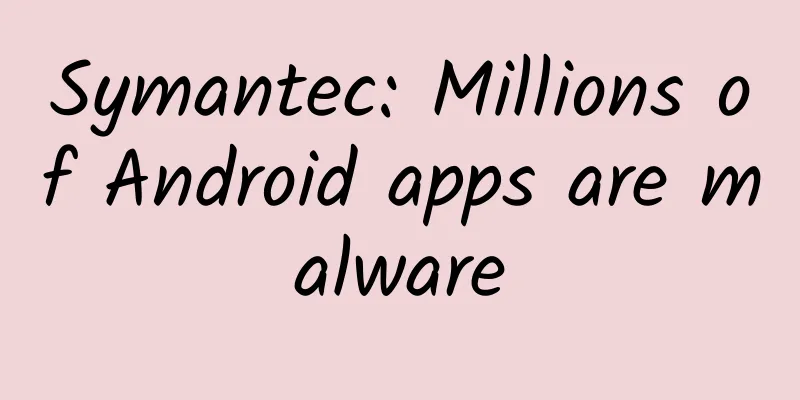Symantec: Millions of Android apps are malware

|
Editor's note: This seems to need no further explanation. Just get used to the Android system's permission explosion and malware. On April 25, Symantec, a global leader in Internet security technology, issued a warning in its latest Internet Security Threat Report that 17% (about 1 million) of all Android applications are actually malware in disguise. In the 2013 report, there were about 700,000 applications containing viruses. One-third of Android apps are what Symantec calls "greyware," which are mobile apps that bombard you with ads. Symantec also found the first mobile crypto-ransomware, which encrypts your data and holds it hostage for a ransom. The good news is that these malware are easy to prevent, as long as you download apps from a trusted app store, such as Google's Play Store. Symantec did not disclose how many types of malware it found in the Play Store, but Kevin Haley, director of the company's security response center, admitted that the number is quite low. "Google does a very good job of preventing malware," Harry said. "If malware shows up in its Play Store, Google will find it immediately and remove it." On the other hand, if you visit other Android app markets and download apps from app developers' websites, or download them via email links or on Bit Torrent sites, your phone's risk of being infected increases significantly. Symantec used its Norton Mobile Insight software to comb through more than 200 Android app stores in 2014, downloading and analyzing more than 50,000 apps or app updates every day. Harry said that most of the malware they found tried to steal personal data, such as mobile phone numbers, contact lists, etc., and then sell them on the Internet black market. Some malware can force your phone to send text messages to premium text messaging services, automatically increasing your monthly phone bill. Other apps may randomly send you ads, and some apps can even change your default ringtone to an ad. The Android malware problem is even worse outside the United States, particularly in regions where users don't have access to Google Play and must rely on third-party app marketplaces. If you notice unusual text message bills or unsubscribed ads that keep popping up, these are signs that your phone has been infected with malware. The best way to protect your phone is to scan and protect it with a mobile security app. As for Apple's iOS system, Symantec found a total of three infected apps in its iTunes store in 2014, and zero last year. "One of the benefits of the Android vs. iOS competition is that it gives you more freedom, including where to download apps. But this freedom comes at a price," Harry said. |
<<: Google Play opens developer team in China
>>: Talking about Programmers Series: Oh, I am a ghost problem!
Recommend
How much does it cost to make a Maoming marriage and love mini program? What is the quote for making a Maoming marriage and love mini program?
The factors affecting the quotation of Maoming Ma...
Disassembling the three major marketing strategies of Genki Forest
How good is Genki Forest ? There are three pieces...
Android Date Time Picker
[[185911]] Many applications have date pickers, s...
From the "May Day" routine of operation, let's see how to "take advantage of the festival"
Not long after Qingming Festival, May Day comes. ...
Foreign media analysis: Top ten new features worth paying attention to in iOS 9
Every iPhone user is holding their breath, waitin...
Stealing things and beating people, why are the monkeys in Mount Emei so "brutal"?
I don't know when it started, but cursing the...
How dirty are gyms? Here's one more reason not to go to the gym!
When you exercise in the gym, do you carry alcoho...
Why Apple paid $3.2 billion for Beats
Apple is about to make its biggest acquisition in ...
How to increase product repurchase rate? Share 4 tips!
Whether you are doing e-commerce or physical stor...
Epidemic & Capital, Analysis of the Self-help Case of the Medical Beauty Boss in a Short Video
In this cold winter of the epidemic, bosses shoul...
Why has JavaScript become the first choice for many mini-programs?
[[256303]] Since Baidu first proposed the concept...
Analyze these 4 factors of the viral growth model
What is Growth Hacking ? This concept originated ...
Operational Growth | Let’s talk about the growth flywheel of product operations
This time I want to talk to you about product ope...
16 Best JavaScript Frameworks in Chinese
1. AngularJS This "superhero" JavaScrip...
B-end designers come to see! Let us take you to understand the design concept of "B-end C-ization"
introduction The rapid development of Chinese Int...









